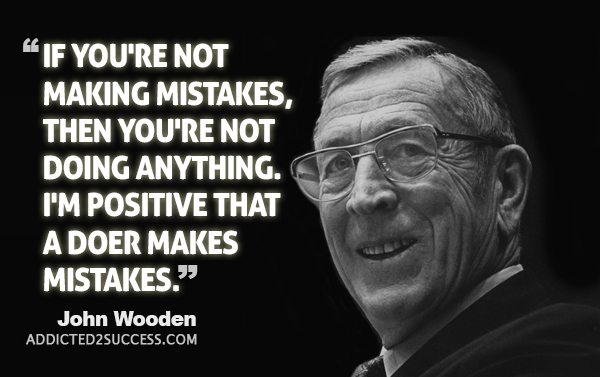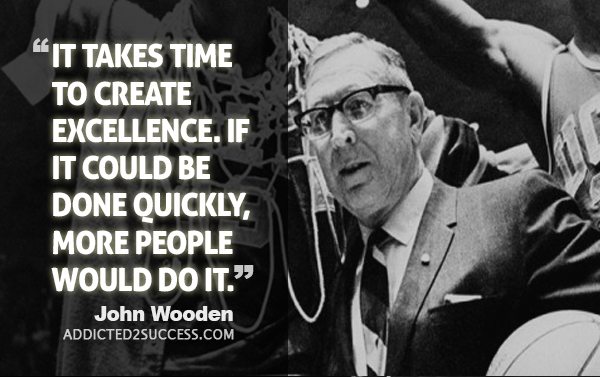Change Your Mindset
103 Unforgettable John Wooden Quotes

John Wooden was an American basketball player and coach. Wooden was the head coach at UCLA and won 10 NCAA National Championships in a 12 year period, including an unprecedented 7 in a row. During his time at UCLA, he was named the national coach of the year 6 times. John Wooden was also the first person ever enshrined as a member of the Basketball Hall of Fame as both a player and as a coach.
Wooden is considered one of the revered coaches in sports history not only because of his basketball coaching greatness, but also because of the inspirational messages he’d share with his players about how to be successful in basketball and in life.
John Wooden was regarded as one of the wisest and best college coaches in the history of college basketball.
Here are 103 unforgettable John Wooden quotes:
1. “Whatever you do in life, surround yourself with smart people who’ll argue with you.” – John Wooden
2. “Talent is God given. Be humble. Fame is man-given. Be grateful. Conceit is self-given. Be careful.” – John Wooden
3. “Make each day your masterpiece“ – John Wooden
4. “If you’re not making mistakes, then you’re not doing anything. I’m positive that a doer makes mistakes.” – John Wooden
5. “Be true to yourself, help others, make each day your masterpiece, make friendship a fine art, drink deeply from good books – especially the Bible, build a shelter against a rainy day, give thanks for your blessings and pray for guidance every day.” – John Wooden
6. “Things turn out best for the people who make the best of the way things turn out.” – John Wooden
7. “There are many things that are essential to arriving at true peace of mind, and one of the most important is faith, which cannot be acquired without prayer.” – John Wooden
8. “If you don’t have time to do it right, when will you have time to do it over?” – John Wooden
9. “Success comes from knowing that you did your best to become the best that you are capable of becoming.” – John Wooden
10. “Success is never final, failure is never fatal. It’s courage that counts.” – John Wooden
11. “Success is peace of mind, which is a direct result of self-satisfaction in knowing you made the effort to become the best of which you are capable.” – John Wooden
12. “In the end, it’s about the teaching, and what I always loved about coaching was the practices. Not the games, not the tournaments, not the alumni stuff. But teaching the players during practice was what coaching was all about to me.” – John Wooden
13. “Just try to be the best you can be; never cease trying to be the best you can be. That’s in your power.” – John Wooden
14. “A coach is someone who can give correction without causing resentment.” – John Wooden
15. “The best competition I have is against myself to become better. – John Wooden
16. “The most important thing in the world is family and love.” – John Wooden
17. “I had three rules for my players: No profanity. Don’t criticize a teammate. Never be late.” – John Wooden
18. “Failure is not fatal, but failure to change might be.” – John Wooden
19. “The worst thing about new books is that they keep us from reading the old ones.” – John Wooden
20th John Wooden Quote – “Passion is momentary; love is enduring.” – John Wooden
21. “You can’t let praise or criticism get to you. It’s a weakness to get caught up in either one.” – John Wooden
22. “Friendship is two-sided. It isn’t a friend just because someone’s doing something nice for you. That’s a nice person. There’s friendship when you do for each other. It’s like marriage – it’s two-sided.” – John Wooden
23. “Do not let what you cannot do interfere with what you can do.” – John Wooden
24. “Adversity is the state in which man most easily becomes acquainted with himself, being especially free of admirers then.” – John Wooden
25. “My eyesight is not nearly as good. My hearing is probably going away. My memory is slipping too. But I’m still around.” – John Wooden
26. “There’s as much crookedness as you want to find. There was something Abraham Lincoln said – he’d rather trust and be disappointed than distrust and be miserable all the time. Maybe I trusted too much.” – John Wooden
27. “Young people need models, not critics.” – John Wooden
28. “You can lose when you outscore somebody in a game. And you can win when you’re outscored.” – John Wooden
29. “I am just a common man who is true to his beliefs.” – John Wooden
30. “Be more concerned with your character than your reputation, because your character is what you really are, while your reputation is merely what others think you are.” – John Wooden
31. “I think the teaching profession contributes more to the future of our society than any other single profession.” – John Wooden
32. “Never mistake activity for achievement.” – John Wooden
33. “What you are as a person is far more important than what you are as a basketball player.” – John Wooden
34. “It’s what you learn after you know it all that counts.”– John Wooden
35. “I think you have to be what you are. Don’t try to be somebody else. You have to be yourself at all times.” – John Wooden
36. “Be true to yourself. Make each day a masterpiece. Help others. Drink deeply from good books. Make friendship a fine art. Build a shelter against a rainy day.” – John Wooden
37. “It isn’t what you do, but how you do it.” – John Wooden
38. “Don’t let making a living prevent you from making a life.” – John Wooden
39. “All of life is peaks and valleys. Don’t let the peaks get too high and the valleys too low.” – John Wooden
40th John Wooden Quote – “Today is the only day. Yesterday is gone.” – John Wooden
41. “Material possessions, winning scores, and great reputations are meaningless in the eyes of the Lord, because He knows what we really are and that is all that matters.” – John Wooden
42. “Consider the rights of others before your own feelings, and the feelings of others before your own rights.” – John Wooden
43. “Don’t measure yourself by what you have accomplished, but by what you should have accomplished with your ability.” – John Wooden

44. “I worry that business leaders are more interested in material gain than they are in having the patience to build up a strong organization, and a strong organization starts with caring for their people.” – John Wooden
45. “I’d rather have a lot of talent and a little experience than a lot of experience and a little talent.” – John Wooden
46. “Well, if you’re true to yourself you’re going to be true to everyone else.” – John Wooden
47. “Winning takes talent, to repeat takes character.” – John Wooden
48. “Defense is a definite part of the game, and a great part of defense is learning to play it without fouling.” – John Wooden
49. “Don’t give up on your dreams, or your dreams will give up on you.” – John Wooden
50. “If I were a young coach today, I would be extremely careful in selecting assistants.” – John Wooden
51. “Teaching players during practices was what coaching was all about to me.” – John Wooden
52. “Discipline yourself, and others won’t need to.” – John Wooden
53. “If a player’s not doing the things he should, put him on the bench. He’ll come around.” – John Wooden
54. “The main ingredient of stardom is the rest of the team.” – John Wooden
55. “Well, your greatest joy definitely comes from doing something for another, especially when it was done with no thought of something in return.” – John Wooden
56. “We can have no progress without change, whether it be basketball or anything else.” – John Wooden
57. “When you hurry you’re more apt to make mistakes. But you have to be quick. If you’re not quick you can’t get things done.” – John Wooden
58. “Somebody asked me – you know, how come it took you so long to win a national championship? And I said, ‘I’m a slow learner; but you notice when I learn something, I have it down pretty good.’” – John Wooden
59. “Ability is a poor man’s wealth.” – John Wooden
60. “I don’t believe in praying to win.” – John Wooden
61. “You can’t live a perfect day without doing something for someone who will never be able to repay you.” – John Wooden
62. “Just do the best you can. No one can do more than that.” – John Wooden
63. “It’s not so important who starts the game but who finishes it.” – John Wooden
64. “I think that in any group activity – whether it be business, sports, or family – there has to be leadership or it won’t be successful.” – John Wooden
65. “I’m not going to say I was opposed to the Vietnam War. I’m going to say I’m opposed to war. But I’m also opposed to protests that deny other people their rights.” – John Wooden
66. “Be prepared and be honest.” – John Wooden
67. “If I am through learning, I am through.” – John Wooden
68. “Love is the most important thing in the world. Hate, we should remove from the dictionary.” – John Wooden
69. “Earn the right to be proud and confident.” – John Wooden
70. “I think permitting the game to become too physical takes away a little bit of the beauty.” – John Wooden

71. “I don’t think I was a fine game coach. I’m trying to be honest. I think I was a good practice coach.” – John Wooden
72. “I don’t believe in fate.” – John Wooden
73. “You can do more good by being good than any other way.” – John Wooden
74. “If there’s anything you could point out where I was a little different, it was the fact that I never mentioned winning.” – John Wooden
75. “I’m no wizard, and I don’t like being thought of in that light at all. I think of a wizard as being some sort of magician or something, doing something on the sly or something, and I don’t want to be thought of in that way.” – John Wooden
76. “No one can really honestly be the very best, no one.” – John Wooden
77. “Never lie, never cheat, never steal.” – John Wooden
78. “I talked to the players and tried to make them aware of what was good and bad, but I didn’t try to run their lives.” – John Wooden
79. “I like to spend time in the past, with the things that have been important to me.” – John Wooden
80th John Wooden Quote -“I was built up from my dad more than anyone else.” – John Wooden
81. “It takes time to create excellence. If it could be done quickly, more people would do it.” – John Wooden
82. “The best thing a father can do for his children is to love their mother.” ― John Wooden
83. “Talent is God given. Be humble. Fame is man-given. Be grateful. Conceit is self-given. Be careful.” ― John Wooden
84. “Ability may get you to the top, but it takes character to keep you there.” ― John Wooden
85. “Never make excuses. Your friends don’t need them and your foes won’t believe them.” ― John Wooden
86. “Seek opportunities to show you care. The smallest gestures often make the biggest difference.” ― John Wooden
87. “It is amazing how much can be accomplished if no one cares who gets the credit.” ― John Wooden
88. “Don’t let yesterday take up too much of today.” ― John Wooden
89. “Failing to prepare is preparing to fail.” ― John Wooden
90. “It is the little details that are vital. Little things make big things happen.” – John Wooden
91. “Happiness begins where selfishness ends.” ― John Wooden
92. “Players with fight never lose a game, they just run out of time” ― John Wooden
93. “Listen if you want to be heard” ― John Wooden
94. “Never try to be better than someone else. Learn from others, and try to be the best you can be. Success is the by-product of that preparation.” ― John Wooden
95. “Nothing will work unless you do.” – John Wooden
96. “Being a role model is the most powerful form of educating…too often fathers neglect it because they get so caught up in making a living they forget to make a life.” ― John Wooden
97. “Tell the truth. That way you don’t have to remember a story.” – John Wooden
98. “If we magnified blessings as much as we magnify disappointments, we would all be much happier.” – John Wooden
99. “You are not a failure until you start blaming others for your mistakes” – John Wooden
100. “Although there is no progress without change, not all change is progress.” – John Wooden
101. “Be quick, but don’t hurry.” – John Wooden
102. “I’d be satisfied just coaching in high school. I turned down a number of colleges when I was teaching in South Bend, Indiana, before I went into the service. I honestly believe that if I hadn’t enlisted in the service, I would never have left high school teaching. I’m sure I would have never left.” – John Wooden
103. “I’m glad I was a teacher.” – John Wooden
Which John Wooden quote is your favorite and why? Share in the comment section below!
Change Your Mindset
Peter Drucker’s Life Lessons Every Leader Needs to Hear
He believed life had no meaning if it was only about work

Peter Drucker is widely celebrated as the father of modern management. But beyond his groundbreaking theories and contributions to business thinking, Drucker lived a remarkably full and meaningful life, one that offers powerful lessons on leadership, balance, time management, and the pursuit of purpose. (more…)
Change Your Mindset
The Leadership Skill Nobody Talks About (But Changes Everything)
Curiosity often takes a back seat to certainty and gets labeled as a soft skill, which makes it sound obvious and easy

Most of us, when faced with challenges, instinctively seek certainty and answers. In turn, our ego steps in and prompts us to defend our views, double down, or perhaps disengage. (more…)
Personal Development
Want to Change the World? Start by Sharing Your Knowledge
When we’re exposed to new perspectives, our thinking expands, and so does our potential to create

The Power of Ideas
In October 1904, during a thirty-six-hour train journey from Johannesburg to Durban, Mahatma Gandhi read Unto This Last by John Ruskin, a book that would radically alter the course of his life. Reflecting on that night, Gandhi said, “I could not get any sleep. I was determined to change my life by the ideals of the book.” (more…)
Personal Development
Burned Out at Your Desk? Try This 5-Minute Mental Reset
This kind of fatigue doesn’t always feel dramatic, but it’s deadly for momentum

-

 Success Advice3 weeks ago
Success Advice3 weeks agoThe One Mindset Shift That Made Me Irreplaceable At Work
-

 Scale Your Business4 weeks ago
Scale Your Business4 weeks agoWhy Smart Entrepreneurs Never Skip This One Business Expense
-

 Did You Know3 weeks ago
Did You Know3 weeks ago7 Surprising Life Lessons Video Games Taught Me That School Never Did
-

 Success Advice3 weeks ago
Success Advice3 weeks agoHow Playing by the Rules Became the Smartest Business Strategy
-

 Success Advice2 weeks ago
Success Advice2 weeks agoHow to Build Trust, Kill Micromanagement, and Lead a Team That Thrives
-

 Scale Your Business2 weeks ago
Scale Your Business2 weeks agoHow to Build a Workplace People Actually Want to Show Up To
-

 Success Advice2 weeks ago
Success Advice2 weeks agoSuccess Isn’t Sexy: 5 Daily Habits That Actually Work
-

 Scale Your Business2 weeks ago
Scale Your Business2 weeks agoHow Smart Entrepreneurs Cut Financial Chaos in Half with One Simple Switch



























8 Comments